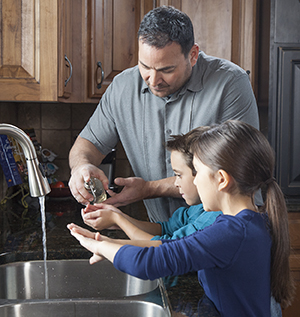A
B
C
D
E
F
G
H
I
J
K
L
M
N
O
P
Q
R
S
T
U
V
W
X
Y
Z
Click a letter to see a list of conditions beginning with that letter.
Click 'Topic Index' to return to the index for the current topic.
Click 'Library Index' to return to the listing of all topics.
Giardia Infection (Giardiasis) in Children
Giardia infection (also called giardiasis) is an intestinal illness caused by the parasite Giardia. This parasite is found in food or water contaminated with stool from infected people or animals. Giardia infection is often passed in contaminated water. This most often happens when someone swallows water from a pool, lake, or stream.
What are common symptoms of Giardia infection?
The following symptoms may vary and often appear 1 to 2 weeks after infection:
Your child can also be infected and have no symptoms at all.
How is Giardia infection diagnosed?
Your child's healthcare provider will examine them. A stool sample is requested to check for the presence of Giardia. More than one stool sample may be needed, because Giardia germs may not pass with every stool.
How is Giardia infection treated?
-
The illness can last 2 to 6 weeks.
-
Medicine may be prescribed by your child's healthcare provider. This clears the infection in most cases. Your child should take all of the medicine, even if they start feeling better.
-
Don’t give your child antidiarrheal medicine unless told to by your child's healthcare provider. It can make the illness last longer and decrease the body’s ability to get rid of Giardia.
-
Give your child plenty of water or a children’s electrolyte solution to drink. This helps prevent dehydration.
When to call your child's healthcare provider
Call your child's healthcare provider right away if your child:
-
Has severe diarrhea that lasts longer than 2 days
-
Shows signs of dehydration (very dark or little urine, excessive thirst, dry mouth, no tears when crying, or dizziness)
-
Has rapid and excessive weight loss
-
Cries and can’t be consoled
-
Seems very tired, slow-moving, or doesn’t respond
How can Giardia infection be prevented?
 |
| Teach your children to wash their hands with soap and warm water to help prevent Giardia infection. |
To prevent your child from passing on a Giardia infection:
-
Clean your child’s bottom well when changing diapers. Afterward, wash your hands with soap and clean, running water. Do the same for your child.
-
Keep your child home from daycare or school until cleared by your healthcare provider.
To lessen the chances of a Giardia infection in the future:
-
Don’t swallow or drink water from pools, lakes, streams, or rivers. When camping or traveling outside the country, don't drink or cook with water unless you know it’s safe. If needed, boil water for at least 1 minute before using it. Or bring a portable water filter specially made to remove parasites such as Giardia.
-
If you drink well water, have it tested once a year for germs including Giardia.
-
Wash your hands with soap and clean running water for 20 seconds while rubbing them together often. Do this before preparing meals or eating food, after going to the bathroom, cleaning your nose, sneezing, or coughing. Wash your hands after caring for cuts or wounds, touching garbage, or handling pets (their food, treats, or waste). Teach your child to do the same.
-
Use a food thermometer when cooking. Cook poultry to at least 165°F (73.8°C). Cook pork, beef, and lamb cuts to at least 145°F (62.7°C). Cook ground meats to at least 160°F (71.1°C).
-
Wash or peel fruits and vegetables before eating.
Online Medical Reviewer:
Barry Zingman MD
Online Medical Reviewer:
L Renee Watson MSN RN
Online Medical Reviewer:
Rita Sather RN
Date Last Reviewed:
12/1/2022
© 2000-2024 The StayWell Company, LLC. All rights reserved. This information is not intended as a substitute for professional medical care. Always follow your healthcare professional's instructions.